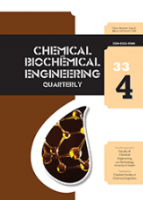
Biochemical Engineering Journal
Scope & Guideline
Pioneering Discoveries in Biotechnology and Environmental Engineering
Introduction
Aims and Scopes
- Microbial Biotechnology:
Research focusing on the application of microorganisms for the production of biofuels, biochemicals, and bioplastics, emphasizing metabolic engineering and biotransformation. - Bioprocess Optimization:
Studies aimed at enhancing the efficiency and productivity of biochemical processes, including fermentation, enzymatic reactions, and downstream processing. - Environmental Biotechnology:
Innovations in bioremediation and waste treatment using biological systems, including microbial fuel cells and anaerobic digestion, to address environmental challenges. - Biocatalysis and Enzyme Engineering:
Development and optimization of enzyme-catalyzed processes for various applications, including pharmaceuticals, food production, and waste treatment. - Sustainable Bioprocessing:
Research promoting the use of renewable resources and sustainable practices in biochemical production, including valorization of agricultural and industrial waste. - Process Design and Modeling:
Application of mathematical and computational modeling to design and optimize bioprocesses, including reactor design and scale-up studies.
Trending and Emerging
- Synthetic Biology and Genetic Engineering:
A surge in research applying synthetic biology approaches, including CRISPR and metabolic pathway engineering, to enhance the production of valuable compounds from microorganisms. - Microbial Fuel Cells and Bioelectrochemical Systems:
An increasing focus on the development of microbial fuel cells and bioelectrochemical systems for energy recovery and wastewater treatment, showcasing their potential in sustainable practices. - Circular Economy Practices:
Growing interest in the valorization of waste materials through bioprocessing, emphasizing the importance of sustainability and resource recovery in biochemical engineering. - AI and Machine Learning in Bioprocessing:
The incorporation of artificial intelligence and machine learning techniques for optimizing bioprocesses and predicting outcomes, reflecting the industry's shift towards data-driven approaches. - Advanced Bioreactor Designs:
Emerging research on novel bioreactor designs, including microfluidic systems and hybrid reactors, to enhance the efficiency and scalability of bioprocesses. - Integrated Bioprocessing Systems:
A trend towards developing integrated systems that combine various bioprocessing steps, such as fermentation and downstream processing, to streamline production and reduce costs.
Declining or Waning
- Traditional Fermentation Techniques:
Research on conventional fermentation processes, particularly those not incorporating modern biotechnological advancements, has seen a decrease as researchers explore more innovative and efficient methods. - Basic Biochemical Pathway Studies:
Studies focused solely on the characterization of biochemical pathways, without application to bioprocessing or biotechnology, have become less prevalent as the field shifts towards applied research. - Single-Organism Studies:
Research that examines the metabolic processes of single microbial species without considering community interactions or co-culturing approaches is less common, reflecting a shift towards understanding complex microbial ecosystems. - Static Bioreactor Systems:
There is a noticeable decline in studies focusing on traditional static bioreactor systems, as dynamic and more sophisticated systems gain prominence in research.
Similar Journals

Bioresources and Bioprocessing
Transforming Bioresources into Sustainable SolutionsBioresources and Bioprocessing is an esteemed open-access journal published by SPRINGER HEIDELBERG, dedicated to the innovative fields of biomedical engineering, biotechnology, food science, and renewable energy. Since its inception in 2014, the journal has rapidly established itself as a leading platform for high-quality research, boasting a Q2 ranking in key categories such as Biomedical Engineering and Biotechnology, and an impressive Q1 status in Food Science for 2023. With robust Scopus rankings placing it in the top percentiles across multiple disciplines, Bioresources and Bioprocessing serves not only as a conduit for original research but also for critical insights into sustainable bioprocessing techniques that contribute to environmental stewardship. It is particularly aimed at researchers, professionals, and students committed to advancing knowledge in the bioprocessing sphere, promoting evidence-based innovations that leverage biological resources for diverse applications. Emphasizing open access, the journal ensures that cutting-edge research is readily available to a global audience, reinforcing its commitment to scientific communication and collaboration.

International Journal of Chemical Reactor Engineering
Enhancing Knowledge in Chemical Reactor Design and SafetyInternational Journal of Chemical Reactor Engineering, published by WALTER DE GRUYTER GMBH, serves as a vital platform for advancing knowledge in the field of chemical engineering, specifically focusing on reactor engineering. The journal, recognized by its ISSN 2194-5748 and E-ISSN 1542-6580, has maintained its commitment to quality research since its inception in 2002 and spans converged years through 2024. With a respectable Q3 ranking in the miscellaneous category of Chemical Engineering and a current Scopus rank of 158/273, it represents a significant resource for researchers aiming to publish innovative findings and practical applications. Although it operates under a subscription model, it still attracts attention for its rigorous standards and insightful contributions to the field. The journal’s focus on the interdisciplinary aspects of chemical reactor design, optimization, and safety underscores its importance in driving forward the technical and theoretical boundaries of chemical engineering. Addressed from Genthiner Strasse 13, D-10785 Berlin, Germany, the International Journal of Chemical Reactor Engineering is a must-read for professionals and scholars dedicated to pushing the frontiers of chemical reaction technologies.

BIOPROCESS AND BIOSYSTEMS ENGINEERING
Innovating Solutions for a Sustainable FutureBIOPROCESS AND BIOSYSTEMS ENGINEERING is a prestigious journal published by Springer, dedicated to advancing the field of bioengineering and biotechnology. Established in 1996, this influential journal provides a platform for disseminating high-quality research that covers a wide spectrum of topics related to bioprocessing, biosystems, and their applications in medicine and environmental engineering. With an impressive impact factor and ranking in the top quartile (Q2) across bioengineering, biotechnology, and miscellaneous medical fields, BIOPROCESS AND BIOSYSTEMS ENGINEERING stands out as a critical resource for researchers, professionals, and students. The journal is indexed in Scopus, reflecting its significant contribution to the scientific community, particularly with its robust percentile rankings (77th in Biotechnology and 70th in Bioengineering). Available in both print and electronic formats, this journal ensures accessible research for those pushing the boundaries of knowledge in bioprocessing and biosystems. As it continues to evolve, BIOPROCESS AND BIOSYSTEMS ENGINEERING encourages submissions that contribute to innovative research practices and applications, thereby fostering academic collaboration and advancement in this dynamic field.

Biotechnology Journal
Driving excellence in applied microbiology and biotechnology.Biotechnology Journal, published by WILEY-V C H VERLAG GMBH, stands at the forefront of biotechnological research and innovation, recognized for its significant contributions to the fields of applied microbiology, molecular medicine, and broader biotechnology. With its ISSN 1860-6768 and E-ISSN 1860-7314, this journal has achieved impressive 2023 quartile rankings, positioning itself in Q1 for both Applied Microbiology and Biotechnology and Medicine (miscellaneous), and Q2 in Molecular Medicine, showcasing its impact and relevance within the scientific community. Based in Germany, the journal aims to disseminate high-quality research that drives advancements in biotechnological applications, fostering a platform for researchers, professionals, and students to engage with cutting-edge developments. With its ongoing commitment to excellence, the Biotechnology Journal is an essential resource for those seeking to stay informed about the latest trends and innovations in biotechnology.

CHEMICAL AND BIOCHEMICAL ENGINEERING QUARTERLY
Innovating Processes, Transforming IndustriesCHEMICAL AND BIOCHEMICAL ENGINEERING QUARTERLY, published by the Croatian Society of Chemical Engineering Technology, is a distinguished open-access journal that has been providing a platform for the dissemination of innovative research since its inception in 1987. With a focus on the fields of biochemistry and chemical engineering, this quarterly journal addresses a wide array of topics, including process chemistry and technology, making significant contributions to both academia and industry. Despite its current positioning in the Q4 category for biochemistry and Q3 for miscellaneous chemistry and process chemistry in 2023, the journal continues to strive for greater impact, catering to researchers, professionals, and students alike. Its open-access model, in place since 2001, ensures that cutting-edge research is accessible to a broad audience, fostering collaboration and knowledge sharing within the scientific community. By promoting high-quality research and providing insights into the latest advancements, Chemical and Biochemical Engineering Quarterly remains an essential resource for those involved in the chemical and biochemical engineering disciplines.

Engineering Review
Showcasing cutting-edge studies in engineering.Engineering Review is a prominent academic journal published by the University of Rijeka, Faculty of Engineering in Croatia. As an emerging outlet in the field of engineering, the journal has been providing a platform for interdisciplinary research since its inception in 2011, with a commitment to disseminating high-quality studies up to the horizon of 2024. Although currently categorized as Q4 in the Engineering (miscellaneous) section and ranking 242 out of 307 in General Engineering per Scopus metrics, the journal aims to bolster its impact and reach within the engineering community. With a focus on innovative approaches and practical applications in various engineering disciplines, Engineering Review invites contributions from researchers, professionals, and students alike, fostering a collaborative environment for the advancement of engineering research in a global context. While it is not an open-access journal at this time, it remains a vital resource for those engaged in cutting-edge engineering endeavors.

KOREAN JOURNAL OF CHEMICAL ENGINEERING
Shaping Tomorrow’s Chemical Engineering Landscape.The Korean Journal of Chemical Engineering is a prestigious publication by the Korean Institute of Chemical Engineers, dedicated to advancing the field of chemical engineering and its associated sciences. Established in 1984, this journal has made significant contributions to the dissemination of innovative research, covering a broad spectrum of topics within chemical engineering and general chemistry. With a current impact factor placing it in the Q2 quartile within both the chemical engineering and chemistry categories, it is recognized for its rigorous peer-review process and high-quality articles. The journal provides a valuable platform for researchers, professionals, and students to share their findings and collaborate on emerging methodologies and technologies. Although it does not offer open access options, its broad international readership, bolstered by its Scopus rankings — including a commendable #108 in general chemical engineering — ensures widespread visibility and dissemination of published works. As it approaches its 40th anniversary in 2024, the Korean Journal of Chemical Engineering continues to be an essential resource for anyone engaged in the field, driving innovation and academic dialogue worldwide.

Biotechnology for Biofuels
Pioneering research for a greener biofuel future.Biotechnology for Biofuels, published by BMC in the United Kingdom, stands at the forefront of renewable energy research. As an open-access journal since 2008, it has become a critical platform for sharing innovative research and developments in the field of applied microbiology and biotechnology, particularly in the sustainable production of biofuels. With an impressive 2023 ranking of Q1 in multiple categories—including Applied Microbiology and Biotechnology, Biotechnology, and Management, Monitoring, Policy and Law—this journal offers unparalleled visibility and accessibility for your work. Its Scopus metrics underscore its influence, with rankings in the top 10% across several categories, emphasizing its integral role in advancing research on environmental sustainability and bioenergy solutions. Researchers, professionals, and students alike will find in this journal a rich resource for current studies, methodologies, and policies essential for navigating the complex landscape of biofuel technology.

BIOTECHNOLOGY AND APPLIED BIOCHEMISTRY
Bridging Research and Real-World Impact.BIOTECHNOLOGY AND APPLIED BIOCHEMISTRY, published by Wiley, is a renowned journal that bridges the gap between fundamental research and practical applications in the fields of biochemistry and biotechnology. With an ISSN of 0885-4513 and an E-ISSN of 1470-8744, this journal has been instrumental since its inception in 1986, focusing on diverse topics including applied microbiology, drug discovery, and process chemistry. The journal is currently recognized in various categories with impressive quartile rankings, showcasing its influence with placements in Q2 for applied microbiology, biotechnology, and biomedical engineering, among others. Researchers and professionals benefit from its comprehensive scope and critical insights into the latest advancements in these domains. Although not an open-access journal, it provides invaluable access options for academic institutions and professionals seeking to stay at the forefront of biotechnology innovations. Its commitment to presenting quality research facilitates the growth of knowledge and fosters collaborations across disciplines, making it an essential resource for anyone invested in the rapidly evolving landscape of biosciences.

PERIODICA POLYTECHNICA-CHEMICAL ENGINEERING
Elevating Academic Dialogue in Chemical EngineeringPERIODICA POLYTECHNICA-CHEMICAL ENGINEERING is a distinguished journal published by the Budapest University of Technology and Economics, focusing on the diverse field of chemical engineering. Established in 1968 and transitioning to Open Access since 1999, this journal provides a vital platform for sharing cutting-edge research and innovations in chemical engineering and related disciplines. With an HIndex that reflects its growing influence and categorized in the Q3 Quartile for Chemical Engineering (miscellaneous) in 2023, PERIODICA POLYTECHNICA aims to facilitate the dissemination of knowledge among researchers, professionals, and students alike. The journal's Scopus rankings in Environmental Science, General Chemistry, Materials Science, and Biochemistry showcase its multidisciplinary approach, making it an essential resource for anyone engaged in advancing their expertise in chemical engineering and the broader scientific community. Located in Hungary, PERIODICA POLYTECHNICA continues to contribute to the academic dialogue and inspire innovative solutions to contemporary challenges.